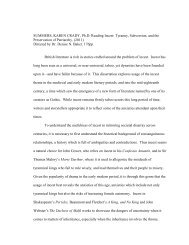THE DEVELOPMENT OF EXECUTIVE FUNCTION IN EARLY ...
THE DEVELOPMENT OF EXECUTIVE FUNCTION IN EARLY ...
THE DEVELOPMENT OF EXECUTIVE FUNCTION IN EARLY ...
You also want an ePaper? Increase the reach of your titles
YUMPU automatically turns print PDFs into web optimized ePapers that Google loves.
(and percentages) of children who passed and failed the postswitch phase in each version. As can be seen, more<br />
than two-thirds of the children in the standard and Negative Priming versions failed. However, only about one<br />
third of the children in the Total Change version failed. The Partial Change and the two Partial-Partial Change<br />
versions were of intermediate difficulty, and performance on these three versions did not differ. Performance on<br />
the standard version was significantly worse than performance on the Total Change χ 2 (1, N = 32) = 6.35, p <<br />
.05. There was also a trend for the Partial Change version and the Partial-Partial Change (target cards) version<br />
to be easier than the standard version, χ 2 (1, N= 32) = 3.46, p < .07 (in each case), and for the Total Change<br />
version to be easier than the Negative Priming version, П 2 (1, N = 33) = 3.64, p < .06. Twelve children (75%)<br />
perseverated (7 or 8 incorrect) in the standard version, 6 (38%) in the Negative Priming version, 5 (31%) in the<br />
Partial-Partial Change (test cards) version, 4 (25%) in the Partial Change version, 3 (19%) in the Total Change<br />
version, and 2 (13%) in the Partial-Partial Change (target cards) version.<br />
Discussion<br />
The results of Experiment 8 indicate that as in Experiment 7, most children passed the Total Change (no<br />
preswitch feedback) version, providing further evidence that children usually do not perseverate on dimensions<br />
per se. The results for the Partial Change (no preswitch feedback) version also resemble the findings from<br />
Experiment 7 (50% passing in Exp. 8 vs. 52% in Exp. 7), and these results support the hypothesis, derived from<br />
CCC theory, that children perseverate on activated rules specifying values of a dimension. Perseveration on the<br />
Partial Change (no preswitch feedback) version cannot be accounted for by negative priming because the<br />
dimension values that were irrelevant (and possibly negatively primed) in the preswitch phase were removed<br />
during the postswitch phase. However, in contrast to Experiment 7, the Partial Change version in Experiment 8<br />
was significantly easier than the standard version. This discrepancy between Experiment 7 and Experiment 8<br />
could be due to procedural changes (feedback vs. no feedback during preswitch) or due to the fact that<br />
participants in Experiment 7 (mean age = 41 months) were younger than the participants in Experiment 8 (mean<br />
age = 38 months). Further explanations for the pattern of findings with respect to the Partial Change version and<br />
the standard version are discussed in the final chapter.<br />
In the Partial-Partial Change versions, persistent activation was possible, but the values of either the target cards<br />
or test cards were partially absent during the preswitch phase (potentially attenuating the need to select the<br />
preswitch rules against a competing alternative). The finding that performance was nearly identical (about 50%<br />
passing) on both Partial-Partial Change versions and on the Partial Change (no preswitch feedback) version<br />
suggests that performance on all three versions may have reflected comparable amounts of persistent activation<br />
of the preswitch rules. Activation may not depend on selecting against a competing alternative, although this<br />
possibility needs to be assessed further because irrelevant values were only partially removed during the<br />
preswitch phase. Under these circumstances, children may, nonetheless, attend selectively to the relevant values<br />
against the irrelevant values.
















